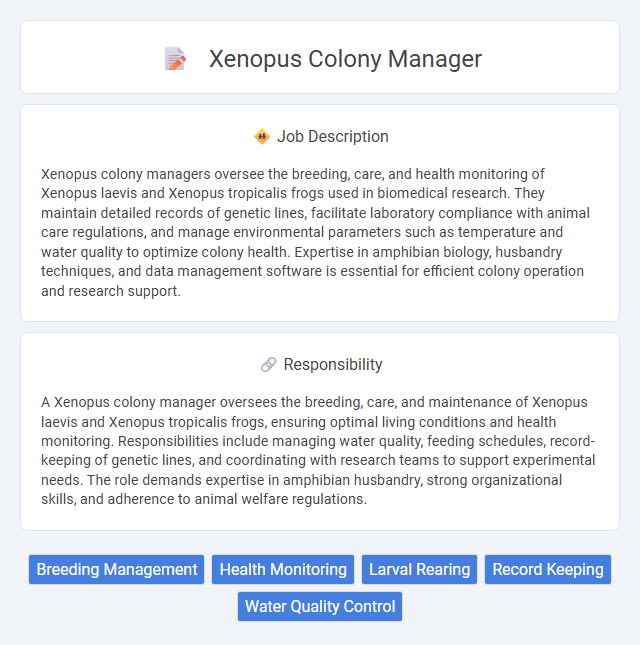
Xenopus colony managers oversee the breeding, care, and health monitoring of Xenopus laevis and Xenopus tropicalis frogs used in biomedical research. They maintain detailed records of genetic lines, facilitate laboratory compliance with animal care regulations, and manage environmental parameters such as temperature and water quality to optimize colony health. Expertise in amphibian biology, husbandry techniques, and data management software is essential for efficient colony operation and research support.
Individuals with strong organizational skills and attention to detail are likely to excel as Xenopus colony managers, as the role involves meticulous care and monitoring of amphibian populations. People who prefer structured environments and can handle routine tasks while ensuring animal welfare may find this job suitable. Those uncomfortable with biological research settings or repetitive duties might face challenges adapting to this position.
Qualification
A Xenopus Colony Manager must possess extensive experience in amphibian husbandry, particularly with Xenopus laevis and Xenopus tropicalis species, ensuring optimal health and breeding conditions. Proficiency in maintaining water quality parameters, egg collection, and embryo staging is essential, alongside strong organizational skills for colony record management and inventory control. A background in biology or animal science combined with hands-on laboratory expertise and familiarity with institutional animal care protocols enhances effective colony management.
Responsibility
A Xenopus colony manager oversees the breeding, care, and maintenance of Xenopus laevis and Xenopus tropicalis frogs, ensuring optimal living conditions and health monitoring. Responsibilities include managing water quality, feeding schedules, record-keeping of genetic lines, and coordinating with research teams to support experimental needs. The role demands expertise in amphibian husbandry, strong organizational skills, and adherence to animal welfare regulations.
Benefit
Benefits of a Xenopus colony manager job likely include gaining specialized skills in amphibian husbandry and laboratory animal care, which can enhance career prospects in research and biomedical fields. There is a probability of working in a collaborative scientific environment that supports professional development and networking opportunities. Competitive compensation and access to advanced research resources may also be expected.
Challenge
Managing a Xenopus colony likely presents challenges related to maintaining optimal environmental conditions for amphibian health and breeding success. The role probably requires meticulous monitoring of water quality, temperature, and feeding schedules to prevent stress and disease. Balancing these factors may be critical to sustaining a thriving colony for research purposes.
Career Advancement
Xenopus colony manager roles offer significant opportunities for career advancement through the acquisition of specialized skills in amphibian husbandry and developmental biology techniques. Professionals in this position often progress to senior laboratory management, research coordination, or scientific technical specialist roles by demonstrating expertise in breeding protocol optimization and data management. Mastery in managing large-scale Xenopus colonies enhances leadership potential and opens pathways to interdisciplinary research projects and academic collaborations.
Key Terms
Breeding Management
Xenopus colony managers oversee the breeding management of amphibian species, ensuring optimal reproduction through controlled environmental conditions and precise health monitoring. They coordinate mating schedules, track lineage data, and maintain genetic diversity for research integrity. Expertise in husbandry techniques and compliance with ethical standards is critical for successful Xenopus breeding programs.
Health Monitoring
Xenopus colony managers ensure rigorous health monitoring protocols to maintain disease-free amphibian populations critical for research integrity. Regular screening for pathogens such as Chytrid fungus and Ranavirus is essential to prevent outbreaks and safeguard colony viability. Effective health monitoring supports optimal breeding success and consistent experimental outcomes in Xenopus laevis and Xenopus tropicalis colonies.
Larval Rearing
Xenopus colony managers specializing in larval rearing oversee the care and development of Xenopus laevis tadpoles to ensure optimal growth and health. They monitor water quality, feeding schedules, and environmental conditions such as temperature and lighting to support efficient metamorphosis. Expertise in larval stage biology and compliance with animal care protocols is essential to maintain a robust and well-managed breeding colony.
Record Keeping
Xenopus colony managers specialize in meticulous record keeping to ensure accurate tracking of breeding, genetic lineages, and experimental data within amphibian research facilities. They maintain detailed logs of individual frogs, including birthdates, health status, and experimental use, enabling efficient monitoring and compliance with research standards. Accurate data entry and database management are critical for facilitating reproducibility and supporting ongoing scientific studies involving Xenopus species.
Water Quality Control
Maintaining optimal water quality is essential in a Xenopus colony manager role to ensure the health and breeding success of African clawed frogs. Regular monitoring of parameters such as pH, ammonia, nitrite, nitrate levels, and temperature prevents disease outbreaks and promotes a stable aquatic environment. Implementing precise filtration, aeration, and water change schedules supports the sustainable management of Xenopus laevis habitats.
 kuljobs.com
kuljobs.com